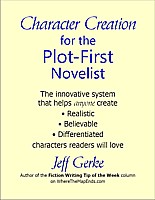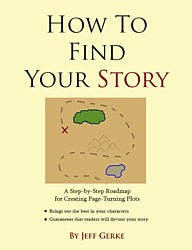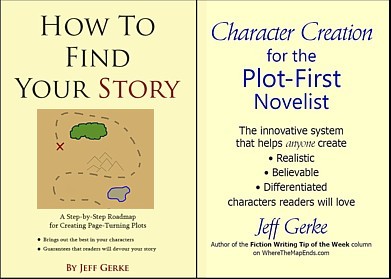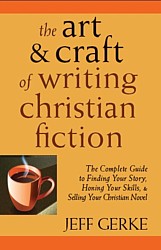|
Tools To Improve Your WritingThe very first thing you must do if you wish to get your fiction before a wide readership is learn the craft. You may have a speculative idea so amazing it will literally altar the future (it's been done many times before) but if your storytelling skills are below standard, no one may ever know about it. Every writer begins with a blank slate when it comes to the craft of fiction. He or she may have good fiction instincts and may have read hundreds of novels but there are principles and disciplines that must be studied and learned. As an acquisitions editor I see an endless stream of proposals that have pretty good ideas but the author has not taken the time to figure out what makes for good craftsmanship. It's like any other craft, skill, sport, or hobby: the first time out, you don't know what you're doing. There's no shame in it. But you do have to learn. I might construct a "workable" cabinet, but it wouldn't be elegant, no one would like to look at it, and I'd never get a job as a carpenter. Unless I trained. The good news is that there are hundreds of books out there on how to improve your fiction. The bad news is...that there are hundreds of books out there on how to improve your fiction. How do you choose? The Very Best Book on the Craft of FictionEvery novelist has his or her favorite book on writing. You'll find one too if you haven't already. But there is one book out there that, as a writer, editor, and acquisitioner, I think is the best on the craft of fiction: Self-Editing for Fiction Writers by Renni Browne and Dave King. I teach this book at writer's conferences. I send authors and agents away with assignments from the book. And I read it for myself. This is the book that single-handedly transformed me from frustrated writer to publishable author. How often do you find a single book on any major field of endeavor that can grant you if not mastery, then at least professional proficiency, in fewer than 200 pages? You may find many other writing books you like over the years, but I think every novelist ought to have Self-Editing for Fiction Writers on his shelf and ingrained into his craftsmanship. The Other Essential BookEvery year Sally Stuart puts out a new edition of her Christian Writer's Guide. For the Christian novelist trying to break in, it's a must-have. Not only does it give an updated listing of every publishing company in the industry (including names, addresses, and current editorial needs), it lists agents, contests, magazines, and more. If you're serious about getting published in the Christian publishing industry, you need the most recent edition of this book. Writer's Helps Developed By MeI have created two interactive tools to help novelists create their stories. The first is called Character Creation for the Plot-First Novelist. As the title suggests, Character Creation for the Plot-First Novelist helps writers create realistic, three-dimensional characters who don't all sound like the writers who created them. If you've been told (or you just sense) that your characters are weak or flat or are just shallow stereotypes, this system will help you. Read more about it here. The second writer's tool I've created is for novelists who may be able to create strong characters just fine, but have a terrible time finding interesting things for those characters to do. How To Find Your Story solves this problem for you. This interactive writer's help takes what you may be better at (character development) and grows your plot from there. The main character's inner journey becomes the basis for a thrilling plot. No longer will people tell you your story meanders or wanders or circles the airport but never lands. Never again will you write 500 pages and still not know if you've rounded the corner on your story. No more will readers tell you your story is too slow to hold their interest. How To Find Your Story produces a satisfying, page-turning plot that is uniquely yours (i.e., not a formula). Read more about this product here. Note that you can purchase both products together for a savings. Finally, be on the lookout for my new print book... The Art & Craft of Writing Christian Fiction includes and expands on my popular Fiction Writing Tips, putting them in desk reference softcover book form. The Art & Craft of Writing Christian Fiction is available for purchase here. Excellent Books on the Craft of FictionEach of the following teaches something of excellence and would be worth reading. Most novelists find that they're naturally one kind of writer or another: plot-first or character-first. Either plots or characters come to you naturally. Me, I'm a plot writer. Plots come to me as easily as breathing. Characters...not so much. They're difficult for me. If I don't work very hard my characters are flat, two-dimensional stereotypes. And that's saying it kindly. I've collected lots of books on how to write strong characters. Incidentally, I have yet to find a book on character-creation that really works for me. The closest I've come is not a writing book at all (see Please Understand Me II in the list below. So, in typical me style, I have written something that may help. It's called "Character Creation for the Plot-First Novelist," and it's available here. Speaking of stereotypes, I'll go out on a limb and say that most writers who are male tend to be plot-first kind of writers. Not all, and I've seen many female novelists who are this way, but that's still a pretty good rule of thumb. Other writers are character-first writers. Interesting characters occur to them all the time. It's when these writers have to sit down and actually make something happen in their stories that they get bogged down. Many (but not all) female novelists fall into this category. There are other authors, especially in speculative fiction, who are setting-first writers. They may not know who is in the story or what the story is about, but man o man is the story world cool. Many of the rest of us have to work hard to make our settings come alive. And then there are books on specific aspects of writing. These are useful to help you shore up weaknesses you see in your own writing. Here are the writing books I think are most useful: Useful Tools Other Than BooksSometimes an aspiring novelist has reached a level of craftsmanship where he or she no longer needs what can be found in a book. That's when you need a personal touch. You need a real human to read your fiction and tell you chat needs to be improved. There are a number of ways to get this human touch. The Christian Writer's GuildThe Jerry B. Jenkins Christian Writer's Guild is an excellent way of securing for yourself an advanced and experienced mentor for your writing. The two-year "Apprentice" course, while pricey, represents for many people an investment in their own careers as writers. I was a CWG mentor for over two years. It's a good program. The Apprentice course offers a surprisingly broad overview of several kinds of writing. The curriculum was written by industry veterans Les Stobbe (the nonfiction section; the first 35 lessons) and Dave Lambert (the fiction section; the last 15 lessons). The more advanced "Journeyman" program allows you to specialize in fiction, if you choose. Critique GroupsFinding the right critique group can seem as difficult as finding the right spouse. There are so many options out there, but most of them will result in heartache for you. There's nothing worse than finding yourself in a bad critique group where the people are mean and seem to live for nothing but to ridicule your writing in order to make themselves feel superior. I've been in a group like that. It almost made me want to give up writing forever. On the other hand, there's nothing so powerfully positive for your writing career than the right critique group. Here you can find caring insight into what is working and what is not working in your writing, delivered with gentleness in an environment of love. A good critique group can lift your writing to that elusive next level. So how do you avoid the one and find the other? Some of it is careful investigation to find a group who brings the mix of experience and genres you're looking for. Some of it is dumb luck (and/or the hand of God). And you won't know whether it's a good fit for you or not until you just give it a few tries. Check in your area for local Christian writer's groups. They are often associated with colleges but are being found more and more through churches. Or if you're more of an online person, I heartily recommend the critique groups offered through the American Christian Fiction Writers. The ACFW has a reputation for being very supportive in critique groups, and they are large enough to have at least one critique group for every writing interest. Christian Writer's ConferencesI give a full list of these on the publishing page so I'll just recap here. A Christian writer's conference is a great place to meet other writers like you, meet professionals in the publishing industry (editors, agents, and more), learn about the biz and the craft, and, if you choose, have your fiction reviewed by a professional editor. Writer's conferences are also the only way non-agented authors can get their fiction in front of the acquisitions editors of most mid-to-large-sized Christian publishing houses. And you should go to one just for the experience. Here are some of the major ones in the United States:
Paid Critique Services and Book DoctorsThere are a number of folks out there offering a range of editorial, critiquing, book doctoring, consulting, and mentoring services. I believe in the idea highly, having availed myself of some of these people myself. Here you are sure to get professional guidance from industry veterans. You may not always agree with what they say, but if you take their counsel to heart you will almost always find the experience was worth the money. Here are some of the best:
If you're serious about improving your fiction skill-set, the options listed on this page will help you. Here's to seeing your book in lights. |
|



